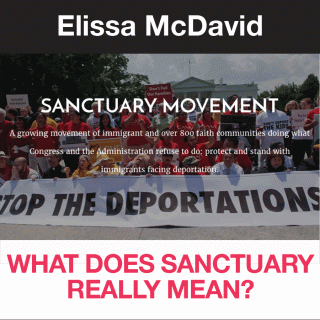What Does Sanctuary Really Mean?
By Elissa McDavid

We are facing reality, as a faith, a nation, and individuals who may not have been as active as we should have been before the election results of November 8th. Those that lived-in fear before, now live in greater fear as families and communities are torn apart, on an even larger scale. Like many people, I am figuring out how to help those that face deportation, fear, and intimidation. I am trying to understand this as a Unitarian Universalist and as a young adult. I am also an intern with the Unitarian Universalist Association Office of Youth and Young Adult Ministries, working with Young Adult and Campus Ministry Associate Annie Gonzalez Milliken, on campus ministry/young adults with the sanctuary movement.
The term sanctuary has been widely used the past few months, with sanctuary campuses, cities, and churches. But what does sanctuary really mean?
A couple weeks ago I had the opportunity to talk about First Unitarian Society of Denver, sanctuary, and what this means as a youth/young adult with Eliana (a youth) and Julia (a young adult and youth advisor), who attend First Denver. Recently, their congregation has been in the spotlight. They have been providing sanctuary for Jeanette Vizguerra. Jeanette is an undocumented immigrant who had her request of stay of her deportation denied. This act is not the first for the First Unitarian Society of Denver. They began the process to declare themselves sanctuary church several years ago and in 2014 they provided sanctuary to Arturo Hernandez Garcia.
I asked Julia and Eliana what sanctuary means to them.
Eliana: “I think providing sanctuary is providing everything you can, to someone who needs it. It is faith in action”
Julia: “Being Unitarian Universalist is about speaking your truth. Providing sanctuary is doing that. It is living our principles”
Understanding what you are providing to those who are seeking sanctuary is key to engaging with sanctuary and living our Unitarian Universalist values.
Eliana and Julia also acknowledged immediately how small first Denver’s action is, in comparison to the number of people who are affected. The actions we do take can feel nearly as ineffective as no action at all, when we realize the enormity of the injustices our country is facing and the size of our faith communities. But our small actions have a much more significant impact when we are part of a network or community all acting in the same way, resisting together. Julia reflected this truth, wondering out loud, “What if every congregation who had the resources did provide sanctuary to someone?”
Not every congregation can provide the type of literal sanctuary for an immigrant or immigrant family. First Denver had a clear plan and structure in place, before taking Jeannette in. They had long and intensive conversations as a congregation in how and what sanctuary looks like. But as Eliana told me, that we must “resist at the level we feasibly and meaningfully can.” In defining sanctuary, we Unitarian Universalists are striving for an expansive definition that includes many actions that make our communities safer for immigrants and all those targeted by harmful and racist policies.
For some with the resources, you can take similar actions to what First Denver is doing. You can educate yourself on how to defend folks from ICE (Immigrations and Customs Enforcement) or prepare yourself for collective actions to protect your community from raids. You can take de-escalation trainings, which are helpful for any situation. Your congregation can also offer its space for immigration justice organizations or legal aid to meet.
What as a faith are we being asked to do? How can we effectively help?
If you are a college student, you can advocate for your university to become a Sanctuary Campus, with specific demands and actions to hold your institution accountable. Will they protect undocumented faculty, students, and staff from ICE coming onto campus?
Take a resource and skill inventory of yourself, with your youth group, campus or young adult group, and congregation and ask how you can provide sanctuary? What skills, resources, tools do you have? How can you actively use them in providing sanctuary?
For me, providing sanctuary means providing the sacredness—the safety you feel when you are in your own church’s sanctuary for others. It is turning the feeling you get when you are in that sacred space and providing it to those that do not have that protection and privilege. For us who do not face the fear and threat of deportation constantly, we must take our own safety and include others in it, to expand our sanctuary walls.
Want to learn more expanded definitions of Sanctuary? Check out this video from BYP 100 and Mijente!
—Ed.